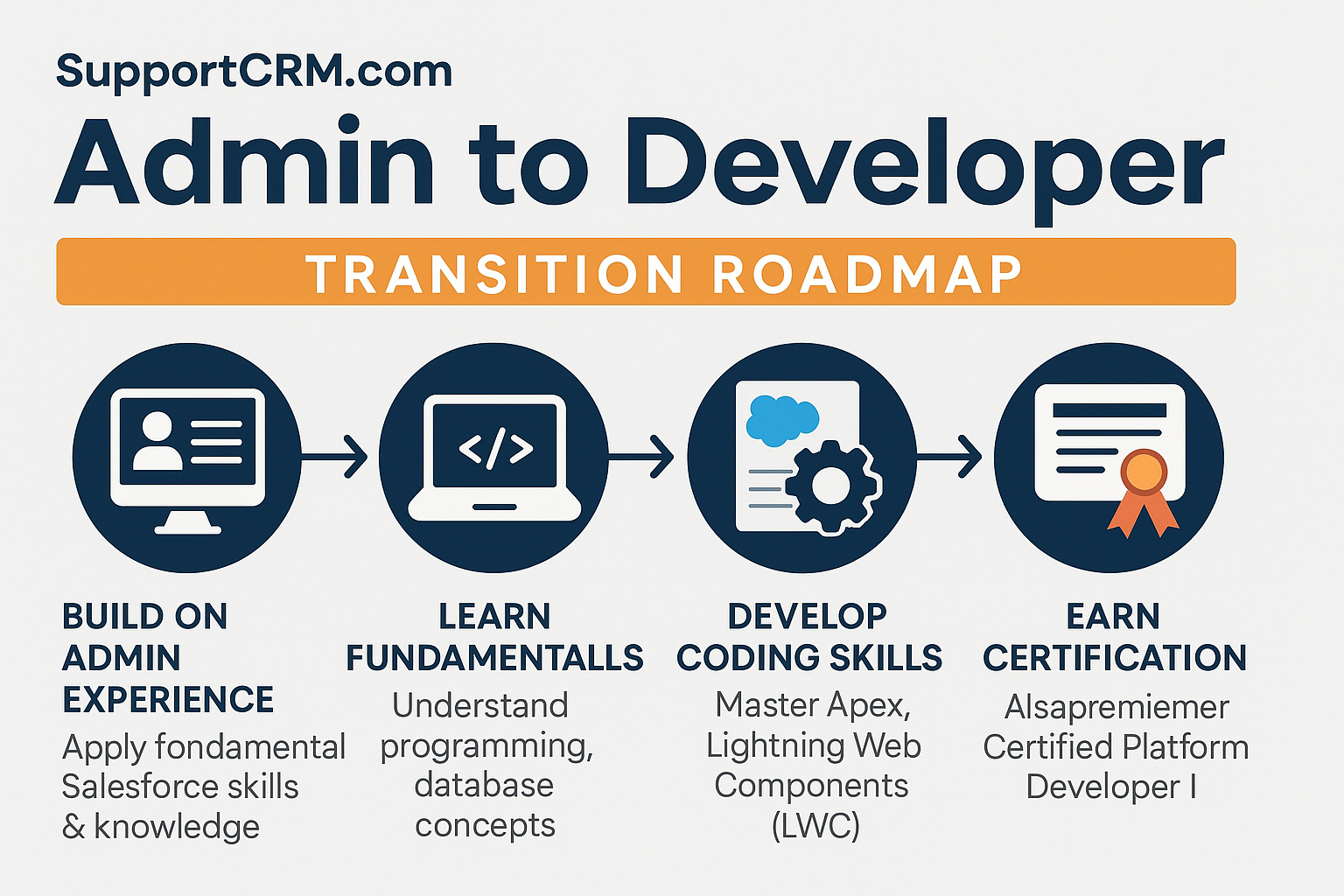Transitioning from Salesforce CRM Admin to Developer
Introduction
Salesforce is the world’s leading Customer Relationship Management (CRM) platform, with millions of professionals working on it daily. For many, the first step into the Salesforce ecosystem begins as a Salesforce Administrator—a role focused on managing users, data, and configurations. But as businesses demand more customization and technical solutions, many Admins find themselves drawn toward the more advanced and lucrative Salesforce Developer role.
If you’re a Salesforce Admin asking: “How do I become a Developer?”—you’re not alone. Transitioning from Admin to Developer is one of the most common and rewarding career moves in the Salesforce ecosystem. This guide will walk you through the skills, certifications, roadmap, and opportunities to make that transition successfully in 2025.

Why Transition from Admin to Developer?
Career Growth & Opportunities
- Higher Salaries: Developers typically earn 20–40% more than Admins.
- Broader Roles: Developers handle coding, integrations, and complex projects.
- High Demand: With the rise of digital transformation, Salesforce Developers are among the top?requested CRM professionals.
- Path to Architect: Becoming a Developer sets the stage for even higher roles like Salesforce Technical Architect.
Salary Insights (2025)
- USA: Admins earn ~$95K, Developers ~$120–140K.
- India: Admins earn ?6–10 LPA, Developers ?10–18 LPA.
- UK: Admins earn £45–55K, Developers £60–75K.
(Source: SalesforceBen Salary Guide)
Understanding the Difference: Admin vs Developer
| Aspect | Salesforce Admin | Salesforce Developer |
|---|---|---|
| Focus | Configuration, users, reports, dashboards | Customization, coding, integrations |
| Tools | Flows, Process Builder, Validation Rules | Apex, Lightning Web Components (LWC), APIs |
| Skills | Business analysis, user training, declarative automation | Programming, data modeling, system integration |
| Certifications | Admin, Advanced Admin | Platform App Builder, Platform Developer I & II |
Admins focus on no?code tools, while Developers extend Salesforce using code and advanced customization.
Skills You Need to Transition
1. Strengthen Declarative Knowledge
Before diving into code, ensure mastery of declarative tools:
- Flows (record?triggered flows, scheduled flows)
- Validation rules
- Custom objects & relationships
- Reports & dashboards
2. Learn Apex Programming
- Apex is Salesforce’s proprietary, Java?like programming language.
- Focus on triggers, classes, SOQL (Salesforce Object Query Language), and governor limits.
3. Explore Lightning Web Components (LWC)
- LWC is the modern front?end framework for Salesforce.
- Learn JavaScript, HTML, CSS basics.
- Build reusable UI components.
4. Understand Integrations
- REST and SOAP APIs
- Middleware tools (MuleSoft, Dell Boomi)
- Authentication and OAuth
5. Develop Version Control & DevOps Skills
- Learn Git/GitHub for version control.
- Use Salesforce DX for CI/CD pipelines.
6. Broaden Problem-Solving & Debugging
- Practice debugging tools (Developer Console, Debug Logs).
- Understand test classes and coverage requirements.
Certifications for the Transition
Must-Have
- Salesforce Certified Platform App Builder – Bridges declarative and technical skills.
- Salesforce Platform Developer I (PDI) – Proves coding knowledge in Apex, LWC, integrations.
Advanced
- Salesforce Platform Developer II (PDII) – Complex coding, advanced data modeling.
- Salesforce JavaScript Developer I – Front?end expertise with LWC.
Optional Boosters
- Integration Architect Certification
- Application Architect Certification (future goal)
Step-by-Step Roadmap: Admin to Developer
Step 1: Solidify Admin Skills
- Get comfortable with automation tools.
- Earn Advanced Admin and App Builder certifications.
Step 2: Start Learning Apex
- Take Trailhead Apex Basics modules.
- Write simple triggers (before/after insert, update).
- Practice SOQL queries.
Step 3: Work with LWCs
- Build small Lightning components.
- Learn modern JavaScript.
- Customize page layouts using LWC.
Step 4: Gain Real-World Experience
- Volunteer for small dev tasks in your team.
- Join open-source Salesforce projects on GitHub.
- Contribute to community projects or non-profits.
Step 5: Earn Developer Certifications
- Study for Platform Developer I.
- Use mock exams, practice orgs.
Step 6: Transition Roles
- Apply for Junior Developer positions.
- Leverage hybrid roles (Admin + Developer).
Step 7: Grow Toward Architect
- After gaining 3–5 years of experience, aim for Application or Technical Architect roles.
Real-Life Example
Priya’s Journey (India):
- Started as Admin earning ?7 LPA.
- Learned Apex, LWC using Trailhead + Udemy.
- Earned Platform App Builder + PDI.
- Transitioned into Developer role at ?14 LPA within 2 years.
James’ Journey (USA):
- Salesforce Admin at $95K.
- Took on integration projects.
- Earned Platform Developer I.
- Now working as Salesforce Developer earning $125K.
Resources for Learning
- Salesforce Trailhead – Free modules for Admins and Developers.
- Apex Developer Guide
- Lightning Web Components Developer Guide
- Online courses: Udemy, Pluralsight, Focus on Force.
- Community: Salesforce Developer Forums, Trailblazer Community.
Challenges & How to Overcome Them
- Fear of Coding: Start small—Apex is similar to Java.
- Time Management: Dedicate 5–10 hours weekly for practice.
- Imposter Syndrome: Join communities, ask questions, grow confidence.
- Lack of Real-World Exposure: Volunteer for projects, even small ones.
SEO & Content Optimization
- Keywords: Salesforce Admin to Developer, Salesforce career transition, Salesforce Developer roadmap, Salesforce Developer salary.
- Meta Description: “Learn how to transition from Salesforce CRM Admin to Developer in 2025. Explore skills, certifications, roadmap, and salary insights.”
- Alt Text for Images: “Salesforce Admin vs Developer chart”, “Salesforce Admin to Developer roadmap infographic”.
Conclusion & Call-to-Action
Transitioning from Salesforce Admin to Developer is not just a career move—it’s a leap into high?demand, high?paying opportunities. With the right roadmap—mastering declarative tools, learning Apex and LWCs, gaining certifications—you can successfully transition by 2025.
? Ready to make the leap?
- Explore Salesforce Developer roles at SupportCRM.com
- Upload your resume to get noticed by top recruiters
- Set job alerts for Admin-to-Developer transition roles
Your Salesforce career evolution starts today. Take the first step toward becoming a Developer!
